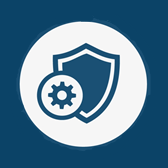
Working from home has provided workers across the U.S. an opportunity to stop the spread of the novel coronavirus, as more employees are working remotely now more than ever before.
With telecommuting on the rise, so are cybersecurity risks. The FBI estimates that cybersecurity attacks are up by as much as 300% as bad agents take advantage of more lax security while employees dial in from home.
Information and data that once remained within office walls has now infiltrated the home. Hackers are finding sensitive information through unsecured WiFi connections. Family members and house guests now also pose a risk to company privacy, with sensitive data being communicated or kept nearby.
There are bound to be missteps during this period of transition, but some have bigger impacts than others. For example, security liability insurance policies will only cover data breaches that occur on company-issued devices — meaning that doing work on personal computers at home can be costly.
Looking to avoid becoming a risk to your company’s cybersecurity while telecommuting? Here are some tips:
- Regularly update your password: Compromised passwords are responsible for 80% of cybersecurity breaches. Update your password at least every 90 days to stay secure. Skip jotting down passwords on a piece of paper — online password managers can keep track of your passwords, so you don’t have to.
- Ditch the public Wi-Fi: Password-protected connections are much safer than public ones. At home, you can protect your internet connection by setting a unique password. If you plan to log on at another location, such as a nearby coffee shop, consider using a personal hotspot for safer connectivity.
- Update your software: New software updates are outfitted with the latest security measures. To automate this process, change your settings to automatic updates so your devices are always up to date.
- Share boundaries for meetings ahead of time: If you’re going to be talking about sensitive information on a work call, let the attending parties know ahead of time so they can prepare to take the meeting somewhere private and out of earshot of others.
- Don’t fall victim to suspicious emails: Phishing attacks are those where someone pretends to be a trustworthy entity in order to gain personal information — and 44% of employees have fallen victim to these attacks. If an out-of-the-ordinary request for information comes through, confirm it with an outside channel before sharing.
If you’re looking for even more tips to stay secure online, check out this infographic from The Zebra below.

Author bio:
Karlyn is a writer who specializes in the technology and insurance spaces. She believes the best ingredients for success are passion and purpose.
